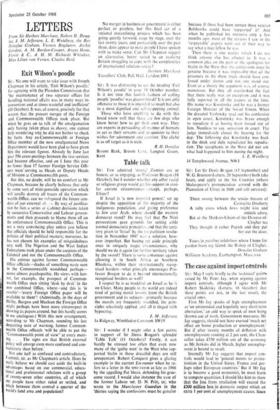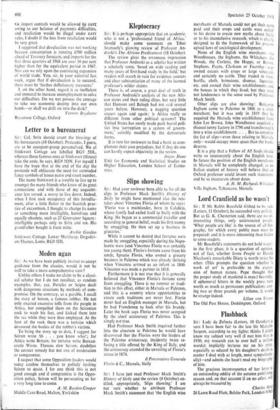The case against import controls
Sir: May I reply briefly to the 'technical' points raised by Mr Peter Jay, when arguing against import controls, ,t1though 1 agree with Mr Robert Skidelsky (Letters, 18 October) that these points are mot, in the last resort, the crucial ones.
First Mr Jay speaks of high unemployment as 'an unintended and hopefully very short-term aberration,' an odd way to speak of men being thrown out of work. Government measures, Mr Jay suggests, should not have exerted 'much net effect on home production or unemployment.' But if after twenty months of deflation with unemployment running at 2 per cent, the Chan- cellor takes £550 million out of the economy as Mr Jenkins did in March, higher unemploy- ment is bound to result.
Secondly Mr Jay suggests that import con- trols would lead to 'general moves to protec- tionism in the United States, France and per- haps other European countries.' But if Mr Jay is to become a good economist, he must learn to compare quantities. I should like him to show that the loss from retaliation will exceed the 1300 million loss in domestic output which an extra I per cent of unemployment causes. Since UK import controls would be allowed by QM owing to our balance of payments difficulties, and retaliation would be illegal under GATT rules, I doubt if the loss from retaliation would be very great.
I suggested that devaluation was not working because consumption is running £500 million ahead of Treasury forecasts, and imports for the first three quarters of 1968 are over 10 per cent higher than for the equivalent period in 1967. Nor can we rely upon the continuing expansion of world trade. You, sir, in your editorial last week, argue that if devaluation is to succeed, there must be 'further deflationary measures.'
I, on the other hand, regard it as inefficient and immoral to increase unemployment to solve our difficulties. Do we not possess the courage to take our economic destiny into our own hands—or shall we drift on into the dark?















































 Previous page
Previous page